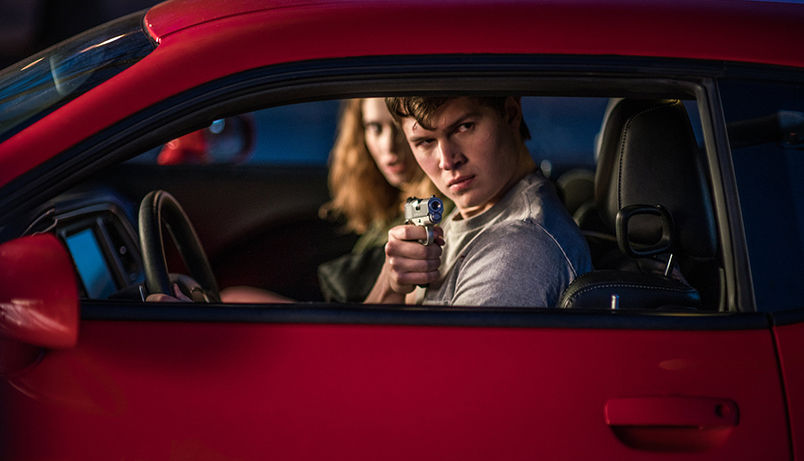Over the last decade, British director Edgar Wright has earned a reputation for infusing his films with two distinct attributes: inventive camera work propelled by razor-sharp editing, and delightfully quirky characters who never drown out (or drown in) the seriousness of the circumstances. “Baby Driver,” Wright’s latest effort about a young getaway driver savant, sees Wright go 1 for 2.
Stylistically, “Baby Driver” has Wright’s effervescent thumbprint all over it right out of the gate — the opening car chase is as good as any car chase montage I’ve ever seen (and I’m not speaking in hyperbole here). Wright keeps the camera away from the ongoing bank robbery, leaving that to our imaginations, and instead remains focused on the driver, early 20-something Baby (Ansel Elgort, “The Fault in Our Stars”) as he rocks out to music in his headphones, making it immediately clear that this film isn’t about the robbers — it’s about the driver.
We are then treated to watching Baby drive the fleeing robbers through the streets of Atlanta in a thrilling high octane chase that appears to be perfectly choreographed to the music in Baby’s earbuds. Baby careens around police cars and civilians with the same inventive, surgeon-like precision with which Wright is capturing all of it. And for the remainder of the film, from a visual standpoint, Wright never takes his foot off the gas; we never lose the sense that he’s having a blast stitching this thing together.
Unfortunately, it becomes pretty clear shortly after this incredible opening chase that none of the characters are worth all the fuss, as Baby’s cliché-riddled backstory (even the phrase “One last ride, then I’m done” gets thrown out there) proves to be a major burden on the film’s momentum. Baby, you see, is merely a troubled youth with a heart of gold. He gravitated toward a life of crime after he lost his loving mother and verbally abusive father in a car crash, which eventually led to him becoming indebted to a criminal mastermind with an insatiable appetite for the big score (Kevin Spacey). Now, Baby wants out, as he’s fallen in love with Debora (Lily James, “Cinderella”), a sympathetic diner waitress with an odd willingness to ignore the glaring red flags and run away with Baby. Blah, blah, blah.
And Elgort isn’t able to do much to elevate our protagonist above cliché. There is a certain level of intrigue to Baby — the way he always listens to music to drown out the tinnitus he obtained from a car crash and, somehow, despite having music playing in his ears, absorbs everything being said around him. And Elgort does manage to capture some of that with his performance. But he also brings a dourness to the role that makes it difficult for us to care about Baby’s fate.
On the plus side, Jon Hamm, Jamie Foxx and newcomer Eiza Gonzalez bring valuable nuance to the proceedings in their respective portrayals of menacing, cold-blooded criminals who have been assigned to Baby’s crew for his supposed final ride. Wright never insults our intelligence by having any of them deliver trite “here’s how I came to be this way” monologues; they just are who they are. But, in spite of their layered performances, in addition to solid turns from James, Spacey and the supporting cast, the film is lacking for characters who possess the signature charm we’ve come to expect from characters in past Wright successes, such as the Simon Pegg vehicles “Hot Fuzz” and “Shaun of the Dead.”
Undoubtedly, “Baby Driver” is, at the very least, a solid movie. On paper, it’s a cross between “Drive,” “Bonnie and Clyde” and, thanks to a rollicking soundtrack that rarely quits, “American Graffiti.” And at its best, it’s on par with all three of those classics. In addition to the exhilarating opening, “Baby Driver” contains another 10 or so scenes that are executed so masterfully that I found myself wanting like crazy to be able to write a glowing review.
But, like a vintage car that spends more time at the mechanic’s than on the road, the sum of the parts of “Baby Driver” (which is rated R), as fantastic as some of those parts may be, doesn’t culminate into a fully satisfying whole.

